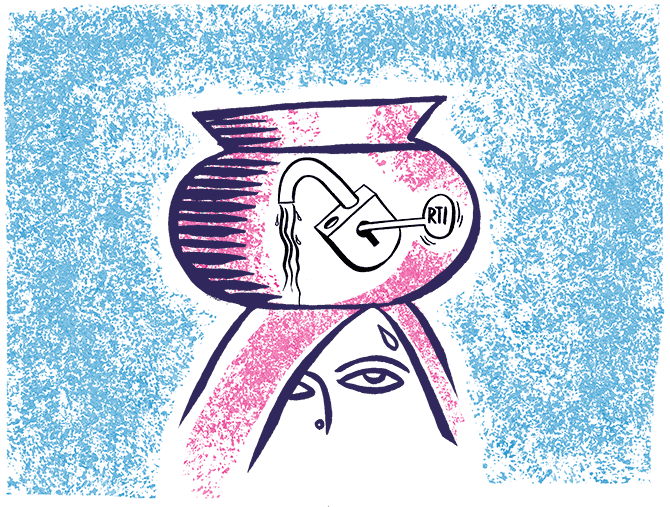 | « Back to article | Print this article |
'With this success (of access to water) the women are convinced that their rights go beyond law books -- and the law is indeed powerful.'
'The women are now not afraid to file a police complaint or file a case in court.'
Aditi Phadnis reports.
Illustration: Dominic Xavier/Rediff.com

At dawn, bus number 969 leaves Sawda Ghevra packed with women.
All day they mop, swab, rinse, wipe, returning in the evening.
At least now, they don't have water on the mind.
"We used to fight for water like animals. Our pots would break, clumps of hair would be torn out, our clothes would rip as we pushed, jostled and hit each other just to get to the mouth of the water pipe of the tanker that would come once a day. I still dream of the day I can open a tap and take a bath under it," said Urmila, the leader of the Ladies of Sawda Ghevra.
When the Commonwealth Games of 2010 were being organised and Delhi was being prettified, slums were uprooted from upscale localities like Khan Market and Karkardooma and relocated close to the Haryana border in a place called Sawda Ghevra.
There was nothing there -- no sewer lines, no school, no community centre, not even any water.
For the first year, families lived under the stars in the middle of mustard fields, protected from the elements only by sheets of plastic and jute.
And there were lots of people -- more than 35,000 of them.
The year 2011 went by as a blur, just clawing to make ends meet.
But as Reshma, one of those who grew up in the slum, said: "You need basic things, right? Water? electricity? Roads?"
The Supreme Court ordered the government that those who had been evicted must be given a place to live. So they were given land pattas -- 12 or 18 square metres per family.
But there was still no water.
Tankers would come once a day -- if they came at all.
Market economies would take over: Men styled themselves as pani pradhan. The tanker would stop in front of the pani pradhan's home first.
It was an exhausting daily struggle.
First, wait for the tanker, then make sure you fill every pot you had because you didn't know when you would get water again.
It was the chance visit of an NGO called the Multiple Action Research Group that spurred action.
MARG, a group of legal activists, suggested to the ladies of Sawda Ghewra that they leverage the Right to Information Act to first find out what their water entitlement was and then petition the government to implement it.
As the women were unlettered, MARG helped them draft RTIs.
For 35,000 families, 80 tankers were supposed to visit every day.
The community kept a log. It was never more than 22 every day.
So they asked the Delhi Jal Board: How many tankers are we entitled to? How many do you dispatch? What time? Which location?
When the tankers did come, they would quiz the driver, gently, un-threateningly, oh so sweetly: "Will you come on Sunday? Why not? We need water on Sundays too, you know."
Gradually, the system got streamlined.
The government began to tell the contractors it needed only GPRS-equipped tankers: "There was just too much pressure from those women of Sawda Ghevra."
So many things happened to the women: They became leaders.
Not only did the tankers begin to come once a day at a given time, but the women also put their foot down on drug abuse (it is less, though still widespread) and community problems such as domestic violence.
Reshma was a child when she moved with her parents to Sawda Ghevra. Now 19, she works as a nurse in a private hospital.
"I filed three RTIs. And now I am going to file RTIs to make sure the government puts in a water line. We know the Constitution. It is our right to get water."
Canny to the last, the population of Sawda Ghevra says they know they are a vote bank.
"We talk to all political parties very politely. We assure them all that they will be our first choice. But we are clear: 'No pipeline, no vote'," says Urmila.
"With this success (of access to water) the women are convinced that their rights go beyond law books -- and the law is indeed powerful. The women are now not afraid to file a police complaint or file a case in court," says Noor Alam, programme manager at MARG.
"They don't cry or see themselves as victims or blame the government, but use the law to claim their rights."
The struggle now is to get a water line.
Shades of Oliver Twist?